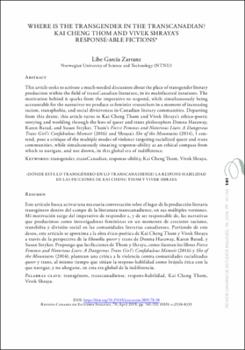Where Is the Transgender in the TransCanadian? Kai Cheng Thom and Vivek Shraya’s Response-Able Fictions
Autor
García Zarranz, LibeFecha
2019Resumen
Este artículo busca activar una necesaria conversación sobre el lugar de la producción literaria
transgénero dentro del campo de la literatura transcanadiense, en sus múltiples versiones.
Mi motivación surge del imperativo de responder a, y de ser responsable de, las narrativas
que producimos como investigadoras feministas en un momento de creciente racismo,
transfobia y división social en las comunidades literarias canadienses. Partiendo de este
deseo, este artículo se aproxima a la obra ético-poética de Kai Cheng Thom y Vivek Shraya
a través de la perspectiva de la filosofía queer y trans de Donna Haraway, Karen Barad, y
Susan Stryker. Propongo que las ficciones de Thom y Shraya, como ilustran los libros Fierce
Femmes and Notorious Liars: A Dangerous Trans Girl’s Confabulous Memoir (2016) y She of
the Mountains (2014), plantean una crítica a la violencia contra comunidades racializadas
queer y trans, al mismo tiempo que sitúan la respons-habilidad como brújula ética con la
que navegar, y no ahogarse, en esta era global de la indiferencia. This article seeks to activate a much-needed discussion about the place of transgender literary
production within the field of transCanadian literature, in its multifaceted iterations. The
motivation behind it sparks from the imperative to respond, while simultaneously being
accountable for the narratives we produce as feminist researchers in a moment of increasing
racism, transphobia, and social divisiveness in Canadian literary communities. Departing
from this desire, this article turns to Kai Cheng Thom and Vivek Shraya’s ethico-poetic
storying and worlding through the lens of queer and trans philosophers Donna Haraway,
Karen Barad, and Susan Stryker. Thom’s Fierce Femmes and Notorious Liars: A Dangerous
Trans Girl’s Confabulous Memoir (2016) and Shraya’s She of the Mountains (2014), I contend,
pose a critique of the multiple modes of violence targeting racialized queer and trans
communities, while simultaneously situating response-ability as an ethical compass from
which to navigate, and not drown, in this global era of indifference.





